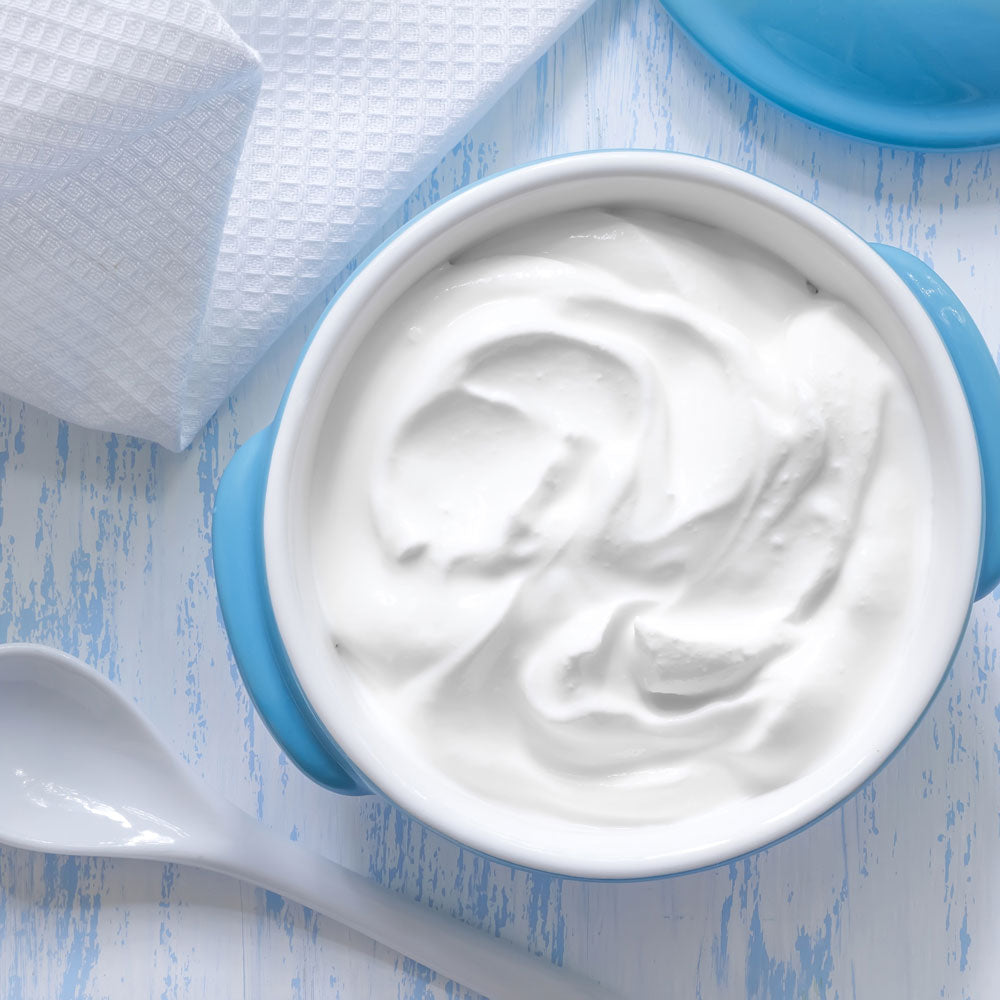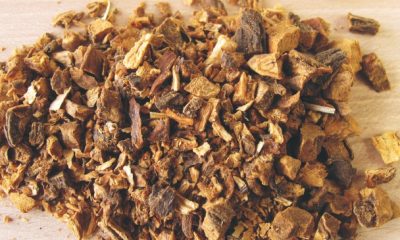Food
Benefits of probiotics and side effects

Table of Contents
Discover the 10 shocking health benefits of probiotics and side effects.
Traditional probiotic yogurt is made from dairy that is fermented into a creamy food packed with beneficial probiotics and is a balanced source of protein, fat, carbohydrates, vitamins, and minerals.
Yogurt is considered a superfood when sourced from grass-fed cows or goats, yogurt nutrition is maximized, supplying omega-3 fatty acids, whey protein, calcium, magnesium, potassium, vitamin D, vitamin K2 and enzymes that make the benefits of probiotic yogurt truly amazing.
Dairy yogurt can be made from goat’s or sheep’s milk, but traditional cow’s milk is still the most popular, plus, yogurt is the most widely consumed fermented dairy product in the United States today, with the second being the kefir.
The fermentation of dairy milk is believed to date back more than 6,000 years to Central Asia as a way to preserve milk. Historical records place yogurt in India, Persia, and Turkey not long after it was seen in Central Asia.
Yogurt was prized for its creamy texture and many uses. Back then, fresh milk used to be carried in the stomach lining of animals, where many believe that healthy bacteria, along with the weather, contributed to fermentation.
Today, however, the process is very different! Dairy milk is heated to the point of killing existing bacteria, a process known as pasteurization.
An initial culture of live bacteria is introduced, and the milk is allowed to ferment for several hours until it is thick, rich, and sour.
Health benefits of probiotics
So why is probiotic yogurt so good for you? In a study published a couple of years ago, 6526 people were studied, and yogurt intake was directly associated with better overall diet quality, healthier metabolic profiles, healthier blood pressure, and triglyceride levels.
Additionally, probiotic yogurt benefits were found to be an excellent source of calcium, potassium, magnesium, zinc, and vitamins B2; Yogurt is great for overall health and wellness, and probiotic-rich foods are central to the GAPS diet plan. Here are 10 proven health benefits of probiotics:
1.- Benefits of probiotics for digestion
The healthy bacteria added to yogurt help improve the microflora in the gut, which is responsible for digestion and a healthy digestive tract.
These active cultures can help with certain gastrointestinal conditions, such as colon cancer, IBS, constipation, diarrhea, and lactose intolerance.
Many people who struggle with lactose intolerance find yogurt to be a calming food, not one that causes digestive problems.
2.- Benefits of probiotics for diabetes
In a recent study, a higher intake of probiotic yogurt is directly associated with a lower risk of developing type 2 diabetes, the benefits of probiotics are supported by the digestion and absorption of nutrients throughout the digestive tract; This is essential for healthy blood sugar regulation.
3.- Benefits of probiotics for colorectal cancer
In a large study of more than 45,000 individuals, consuming the benefits of probiotic yogurt was shown to protect against colorectal cancer, the researchers noted that “the protective effect of yogurt was evident throughout the cohort.” The reason for this is a healthier digestive tract, due to the probiotics and healthy bacteria in the yogurt.
4.- Benefits of probiotics for osteoporosis
According to Jeri Nieves, Ph.D., MS, and director of the Helen Hayes Hospital for Bone Density Testing in New York, “Proper nutrition plays an important role in the prevention and treatment of osteoporosis, and the micronutrients of greatest importance are calcium and vitamin D.
The combination of calcium and vitamin D has a clear skeletal benefit, provided the dose of vitamin D is high enough. “ Dairy yogurts are rich in calcium and many dairy yogurts are fortified with vitamin D, however, raw cow’s milk yogurt is not. I need fortification as it contains 38 IU per quart!
5.- Benefits of probiotics for weight loss
According to the University of Tennessee at Knoxville, the benefits of probiotic yogurt increase fat loss, the study showed that servings of three to six ounces a day for 12 weeks almost doubled the amount of fat loss compared to others in the study.
The group that consumed the probiotic yogurt and extra calcium to reach 1,100 milligrams lost 22 percent more weight and 61 percent more body fat.
The study also found that the belly region and waist circumference were particularly affected.
6.- Boost the immune system
In a recent study, researchers found that probiotics found in yogurt and other fermented dairy products can enhance the immune system of the intestinal lining by increasing the cells that produce cytokines in the intestine.
The researchers stated that “supplementation of probiotic organisms in childhood could help prevent immune diseases in childhood.”
Another study on infants found that probiotics added to formulas had a significant decrease in fever days, antibiotic prescriptions, clinic visits, and childcare absences.
For adults, the probiotics in yogurt help keep the digestive tract free of disease-causing bacteria,
7.- Reduce high blood pressure
Yogurt has more than 600 milligrams of potassium! for every eight ounces!
In 36 clinical trials and 17 studies, potassium intake and blood pressure reduction are evident, potassium is believed to help decrease sodium reabsorption while influencing nervous system cell function, important for lower blood pressure and improve heart health.
A study conducted by the Harvard School of Public Health found that people who consume two to three servings (or more) per day of low-fat dairy products experience a 50 percent reduction in the risk of developing blood pressure.
So, if you have high blood pressure, start eating the benefits of probiotic yogurt, if you want to maintain healthy blood pressure, eat yogurt.
8.- Reduce bad cholesterol
The health benefits of probiotic yogurt, including Lactobacillus Acidophilus, lower cholesterol levels, with just a 200 milliliter (seven-ounce) serving per day!
In a controlled clinical study, researchers witnessed a 2.4 percent reduction in serum cholesterol.
They believe that regular intake of probiotic yogurt has the potential to reduce the risk of coronary heart disease by 6 to 10 percent.
9.- Regulates moods
The effects of probiotic yogurt benefits on the digestive tract and blood sugar levels have already been discussed, but as a result, the health of our gut is directly related to our mood.
In a study by Gail and Gerald Oppenheimer Family Center for Neurobiology of Stress who studied brain scans during and after the study, researchers found that healthy women who regularly consumed probiotics through yogurt showed more control over emotions and less anxiety when they presented emotional events to them. The yogurt group ate two servings per day for four weeks.
10.- It can help treat chronic pain and brain-related diseases
In the same study mentioned above on mood regulation, researchers found that the benefits of probiotic yogurt have the potential to help with chronic pain, Parkinson’s, Alzheimer’s, and autism.
The researchers also raised the question of whether repeated courses of antibiotics can affect the brain.
Antibiotics are prescribed to kill dangerous bacteria, but they also kill healthy bacteria that reside in our guts.
This reinforces my recommendation that yogurt and other probiotic-rich foods should always be consumed and especially taken after courses of antibiotics.
Nutrition Facts of Probiotics
Protein, vitamin B12, pantothenic acid, potassium, zinc, riboflavin, calcium, and phosphorus make up the nutritional profile of yogurt.
It is a complete food, with just the right balance of protein, fat, and carbohydrates, a single serving can provide more than 25 percent of the daily value for protein and almost 50 percent of the DV for calcium.
It also helps reduce belly fat, denies chemically induced cancer, lowers cholesterol, increases metabolism, and strengthens the immune system.
The benefits of probiotic yogurt are stimulated healthy digestive function and help produce vitamin B12 and K.
Healthy strains of bacteria added to yogurt and kefir include Lactobacillus bulgaricus, Streptococcus thermophiles, Lactobacillus acidophilus, Lactobacillus casei, and Bifidus. The key is to look for yogurt that contains “live and active cultures.”
Omega-3s are healthy fats associated with supporting weight loss, reducing blood pressure, lowering inflammation, fighting cancer, and protecting against cognitive decline.
While we primarily focus on omega-3s in wild-caught salmon and tuna, probiotic yogurt from grass-fed cows makes the list as one of the top available food sources. Dairy products, including yogurt, from grass-fed cows, are higher in omega-3s and CLA.
Side effects of probiotics
Milk allergies are different from dairy “sensitivity” or intolerance. A true milk allergy can cause anaphylactic shock.
A sensitivity to lactose or casein can cause uncomfortable symptoms, but it has rarely turned into an allergy and has acted as a true allergy.
Most people who are sensitive to dairy can enjoy real yogurt made from goat’s milk, sheep’s milk, and A2 cow’s milk.
One study found that for men with lactose malabsorption, consuming raw yogurt with live bacteria helped with digestion and increased butyrate in the system.
Uses of probiotic yogurt
Yes! There are many non-culinary uses for yogurt! Add yogurt to your beauty regimen to experience all the probiotic benefits for your complexion. Your hair and skin will thank you!
-Combat acne with yogurt: Mix 2 tablespoons of yogurt, 1 tablespoon of oatmeal, and 1 tablespoon of raw honey. Apply to the face, paying special attention to areas prone to acne or breakouts. Leave on for 10 minutes, rinse well with warm water, and pat dry.
-Moisturize dry skin – Mix 1 tablespoon of yogurt with ½ tablespoon of coconut oil and apply it on your face, elbows, or even on healing. Relax for 10 minutes and wipe clean with a tissue.
-Moisturize dry hair – Mix 2 tablespoons of yogurt and 2 tablespoons of coconut oil, and apply to hair. Wrap your hair in a towel and relax for 30 minutes. Rinse well in the shower and follow with Homemade Honey Citrus Shampoo. Rinse well.
Food
6 Benefits of sweet orange essential oil

Table of Contents
Food
15 Benefits of bitter leaf and side effects

Table of Contents
- Health benefits of bitter leaf
- 1.- Benefits of bitter leaf for cholesterol
- 2.- Contains Powerful Antioxidants
- 3.- It is a rich source of fatty acids
- 4.- Cure the common flu
- 5.- Benefits of bitter leaf for diabetes
- 6.- Treat dysentery
- 7.- Benefits of bitter leaf for breast cancer
- 8.- Prevents other types of cancer
- 9.- Benefits of bitter leaf for headache
- 10.- Benefits of bitter leaf for malaria
- 11.- Treat typhus
- 12.- Benefits of bitter leaf for blood pressure
- 13.- Improves the immune system
- 14.- Treat hyperuricemia
- 15.- Benefits of bitter leaf for skin
- Side effects of bitter leaf
- Discover the 15 Shocking Health Benefits Of Bitter Leaf and side effects.
The herb commonly known as the bitter leaf is a small tree that can grow up to 5 m. The evergreen tree grows in countries with a tropical climate, mainly in Africa.
The tree has brown or gray bark with a rough texture. It has streaked green leaves with an oblong shape and fine, soft hair on the underside.
It grows wildly outside, such as in a wasteland, on the roadsides, in the fields, or even in the forest. People also grow the plant in their garden for home medicinal needs.
Read on and learn more about the health benefits of the bitter leaf, so that you can obtain many benefits in favor of the integral care of your health.
The genus Vernonia consists of hundreds of species. But usually, when people talk about the bitter leaf, they mean Vernonia amygdalina, Vernonia colorata, and Vernonia calvoana.
These species grow widely and are traditionally consumed in many parts of West and Central Africa.
The leaf has a unique taste: bitter and sweet. Despite its bitterness, many people consume the leaf for its medicinal and nutritional benefits.
Some African countries even export the dried leaves of the Vernonia amygdala to other continents for their restorative quality.
Traditionally, people in Africa have been using leaves to treat several ailments due to their nutritional values and therapeutic properties.
Health benefits of bitter leaf
1.- Benefits of bitter leaf for cholesterol
The cholesterol level is one of the most important health indicators in the human body.
When our cholesterol level rises, we run the risk of many health problems, especially strokes, heart attacks, and Alzheimer’s.
Therefore, to stay healthy, bad cholesterol levels should be lowered. One of the effective ways to prevent the rise of bad cholesterol is to consume bitter leaves.
The February 2008 issue of the “Journal of Vascular Health and Risk Management” had a report on how bitter leaf can level out bad and total cholesterol in our body.
Using animal subjects for the experiment, researchers who participated in the study found that bitter leaf extract lowered LDL cholesterol by 50%.
At the same time, the level of HDL or good cholesterol also increased.
Similar studies have not been conducted in humans. However, the study suggested that it most likely provides a similar effect in humans.
2.- Contains Powerful Antioxidants
Human cells are always under constant threat and attack from dangerous free radicals. The process of oxygen metabolism produces free radicals as an excess product.
These free radicals interact with molecules in our cells, causing damage to nearby stresses and DNA.
Free radicals can be helpful to your body in a small amount, but if the amount is not controlled, it becomes a dangerous problem.
It can lead to fatigue, muscle pain, memory loss, headaches, vision problems, wrinkles, and in the long run, numerous serious health conditions.
Because of this, we need other substances that can fight free radicals, known as antioxidants.
This free radical nemesis can easily be found in abundance in bitter leaves.
As reported in the December 2006 issue of the journal “Food Chemistry”, the antioxidant properties of a bitter leaf can be used by humans to combat the oxidation process and the danger of free radicals.
When incorporated into the diet, this will also improve your health and protect your body against various dangerous diseases.
3.- It is a rich source of fatty acids
Fatty acids are abundantly present in bitter leaf benefits, including linoleic acids and linolenic acids. Both fatty acids are not produced by our bodies.
However, they both serve important roles in boosting our health. Due to our body’s inability to produce these fatty acids, we need to obtain fatty acids from our diet.
According to the study that was published in the American Journal of Clinical Nutrition in November 2001, these two fatty acids have a protective characteristic against cardiovascular diseases. When taken regularly as part of the diet, fatty acids can prevent various health problems.
Research subjects who took the highest amount of linolenic and linoleic fatty acids have a reduced risk of cardiovascular disease by about 40%.
In contrast, those who took the least amount and frequency of both fatty acids are at higher risk of cardiovascular disease.
4.- Cure the common flu
Some researchers have shown that bitter leaf extract combined with Siberian ginseng serves as a good herbal remedy for treating the common flu.
The concoction must be taken within the first 72 hours of infection for it to work. In about two to three days, all common flu symptoms, including sneezing, headache, and runny nose, will go away as the energy level returns to normal.
Some studies also showed that bitter leaf extract and Siberian ginseng are also very effective in treating the common cold in children.
This effectiveness is mainly due to the antimicrobial properties and the vitamin C in the extract that can improve the body’s immune system against diseases and eradicate viruses at the same time.
The concoction can also warm the body and prevent the cold from happening.
When you start to feel bad, you should drink the bitter leaf mixture to prevent flu or other related illnesses.
5.- Benefits of bitter leaf for diabetes
A bitter leaf contains a generous amount of andrographolide, the compounds that are effective in lowering blood glucose levels.
According to the study conducted by Gajah Mada University researchers in 2004, drinking boiled bitter leaf water can lower glucose levels in male rats as animal subjects. While the research was not done on the human subject, this research is positive.
Another animal test also confirmed this quality. Some African researchers from the Bandung Institute of Technology conducted an experiment with rabbits for the same topic.
Researchers found that the andrographolide in bitter leaf extract possesses a hypoglycemic effect or the ability to lower blood sugar.
One of the possible benefits of this feature is the ability to prevent and treat diabetes mellitus.
The disease characterized by high blood sugar due to lack of insulin can be treated by regularly drinking the mixture of bitter leaves.
In addition to drinking the concoction, you should also consume plenty of fibrous fruits and vegetables, maintain a physically active life, and give up smoking because it negatively affects glucose uptake into cells.
6.- Treat dysentery
Bitter leaf mixture can also be an effective herbal remedy for treating dysentery. Dysentery is a disease in which inflammation occurs in the colon.
Symptoms are stomach cramps along with severe diarrhea and blood or mucus in the stool. While hydration is fatal, the remedy is also urgently required.
The health benefits of the bitter leaf offer a powerful ability to treat dysentery.
To get the corrective property of the leaves, you need to crush some dry bitter leaves and put them in boiling water.
Then turn off the stove and filter the mixture before drinking the water. You should consume the herbal drink three times a day: in the morning, in the afternoon, and in the evening.
7.- Benefits of bitter leaf for breast cancer
Breast cancer is a threat to many women around the world. In the United States alone, BreastCancer.org estimates that no less than 10% of women will suffer from at least one form of breast cancer at some point in their lives.
Your risk of breast cancer can be reduced by maintaining a healthy lifestyle, including regular exercise, a low-fat, green diet, and weight balance.
To equip yourself with a better weapon against breast cancer, consume bitter leaves regularly.
The antioxidant properties present in the leaf can fight cancer cells and inhibit their growth.
The study carried out by some scientists at Jackson State University managed to demonstrate this wonderful quality of bitter leaves.
The researchers conducted a test-tube study on the effect of bitter leaf extract on human breast cancer cells.
According to the study that was published in the February 2004 issue of the journal Experimental Biology and Medicine, it can be concluded that bitter leaf can inhibit the growth and spread of human breast cancer cells.
8.- Prevents other types of cancer
Besides breast cancer, bitter leaf benefits also work effectively as a cure for other types of cancer.
Andrographolide compounds that are present in the bitter leaf can inhibit the growth and development of cancer and tumor cells.
The anti-cancer properties in the bitter leaf are revealed through various studies.
In one of the studies, the leaf is effective in fighting lymphocytes attacked by leukemia.
A study by some Japanese researchers found that bitter leaves can stop the activities of gastric cancer cells.
It does this by preventing and altering the synthetic process of cancer cell DNA.
It is also very easy to use bitter leaves as a herbal remedy to treat cancer.
You just have to prepare fresh bitter leaves and boil them with water.
Once the mixture is warm or cool enough, drink it in one sitting. Drink the concoction two to three times a day while continuing the treatment as prescribed by your doctor.
9.- Benefits of bitter leaf for headache
Bitter leaf benefits are also very effective in treating a headache, including types of headaches caused by flu and fever.
To get the benefit, make a bitter leaf mixture by crushing a handful of bitter leaves and mixing them with water. Boil the tea and drink it once it cools down.
10.- Benefits of bitter leaf for malaria
Malaria is an infection caused by the Plasmodium parasite that is carried into the blood by mosquito bites.
Plasmodium is commonly found in tropical countries, therefore, in many tropical countries, suffering from malaria remains a risk.
Malaria is a dangerous disease that potentially causes deaths. Fortunately, bitter leaves can be an effective herbal treatment for infection.
One of the active substances present in the leaf is andrographolide. Andrographolide is known for its antiparasitic property.
According to some studies, the substance is an active ingredient that inhibits the growth of the parasite and can therefore be extracted for antimalarial medication.
Andrographolide achieves this result by disrupting the defense system of Plasmodium and preventing its development.
As the parasite’s immune system goes down, the oxidative process is affected and the parasite is easily destroyed.
However, the scientific world has not concluded the proper method and dosage for the treatment of malaria using the extract of bitter leaves.
Therefore, you should never use it as your primary treatment, unless you cannot get access to the medications prescribed by the doctor.
11.- Treat typhus
Worldwide, there are at least 26.9 million cases of typhoid fever reported annually. The diseases generally take about 200,000 deaths.
Typhoid fever is an infection from the bacteria Salmonella typhimurium that is transmitted from one human to another.
The bacteria enter the human body system through feces or infected food and drink.
The bacteria first enter the human body through the mouth and then travel to the intestine and into the bloodstream. This is where it gets dangerous.
Typhi spreads to other organs and tissues without much defense by the human immune system because bacteria can safely live inside host cells.
High fever and stomach pain are the main symptoms of the infection.
If typhoid patients do not receive proper treatment, they will be at risk of death because the bacteria kills 25 percent of those infected.
However, when it is treated early, it will be successfully eradicated.
Antibiotics are generally prescribed by doctors to kill the bacteria. During this period, bitter leaf mixture or bitter leaf supplements in other forms can also be taken to accelerate healing.
Andrographolide, tannin, flavonoid, and saponin have antibacterial properties that will be a good help to eliminate bacteria.
12.- Benefits of bitter leaf for blood pressure
Hypertension is also a disease that affects many people in the world. Avoiding this common disease is not an easy task, however, the disease poses a danger when not properly treated.
Prolonged, untreated high blood pressure will cause some complicated problems, such as heart attack, stroke, kidney problems, blurred vision, and even death.
Doctors generally prescribe drugs such as diuretics, beta-blockers, or calcium channel blockers for their hypertensive patients.
However, these chemical medications are not the only treatment for hypertension.
There are several herbal alternatives for people suffering from hypertension and one of the effective herbal ingredients is a bitter leaf.
Bitter leaves can prevent and treat hypertension because they contain a large amount of potassium that can stimulate the body’s salt secretion.
In addition, the leaf also contains very little sodium, which is supposedly responsible for the increase in blood pressure.
Also, the potassium in the bitter leaf will dilate the arteries and prevent arteriosclerosis. As a result, it also eases blood flow and stabilizes high blood pressure.
13.- Improves the immune system
Another benefit of bitter leaf is the ability to boost your immune system. Our immune system is our best defense against infections and diseases that threaten our health.
When your immune system is weakened, you are under threat from many contagious diseases.
Fortunately, drinking bitter leaf tea or taking bitter leaf extract can give your immune system a significant boost.
It is the reason behind the popularity of bitter leaf tea as an herbal drink in some parts of the world.
14.- Treat hyperuricemia
Hyperuricemia is the condition when uric acid in the blood is abnormally high. Typically, this abnormal condition manifests itself in gouts, such as monoarthritis in the big toe, knee, and joints.
It can also trigger a form of hematuria, which is pain felt in the area of the abdomen, flank, or groin region accompanied by nausea.
Chronic pain can disrupt activities and sleep. To treat the disease, a proper diet must be planned and followed.
It is also recommended to incorporate bitter leaves in the daily diet of patients to aid treatment.
The ketones, aldehydes, and flavonoids in the bitter leaves will neutralize the uric acid level and eliminate the symptoms.
15.- Benefits of bitter leaf for skin
Some substances in bitter leaf benefits are natural antibacterial agents that will kill bacteria that cause inflammation on the skin when acne occurs.
In addition, these substances also have antioxidant properties that naturally fight free radicals that accelerate the aging process.
Drinking bitter leaf tea will keep wrinkles and sunspots at bay. Your skin tissue will be rejuvenated and you will look younger and healthier.
Side effects of bitter leaf
There isn’t sufficient credible information available on the side effects of bitter leaf.
However, scientific evidence instructs that bitter leaf should not be consumed in great amounts – because, at high doses, it comes to be toxic and poisonous to human cells.
Food
16 Benefits of corn and side effects

Table of Contents
- 16 health benefits of corn
- A.- Benefits of corn for health
- 1.- Good for digestion
- 2.- Prevents anemia
- 3.- Greater energy
- 4.- Lowers LDL cholesterol
- 5.- Facilitates weight gain
- 6.- Prevents diabetes and hypertension
- 7.- Stronger connective tissue
- 8.- Benefits of corn for eyes
- 9.- Anti-cancer properties
- 10.- Benefits of corn during pregnancy
- 11.- Benefits of corn for heart
- 12.- Prevents Alzheimer’s disease
- B.- Benefits of corn for the skin
- C.- Benefits of corn for hair
- Nutritional value of corn
- Discover the 16 shocking Health Benefits Of Corn and side effects.The corn, also known as corn or Bhutta / Makkai / Challi Hindu, Mokka Jonnalu Telugu, Tamil Makkacholam, ‘Makai’ in Marathi and Punjabi, and ‘Butta’ in Bengal.
Corn is a large grain plant that is said to have originated in Mexico and Central America. Although it looks like a vegetable, it is a food grain.
The leafy stem of the plant produces spikes, which contain the grains known as kernels.
For every grain on the cob, there is a silk thread.
White and yellow kernels are the most popular, but today corn is also available in red, brown, blue, and purple.
The white and yellow hybrids are known as butter and sugar corn that contain both types of kernels.
Young or baby corn is available in cans or jars in supermarkets and is used in Asian cuisine.
This grain is generally available in summer and can be cooked in several ways.
Sweet corn can be used to garnish fresh rice or cooked with onion and chili peppers for a snack. It can even be eaten straight from the cobs.
In India, vendors are often seen selling corn, which is known as ‘button.
The best part is that corn is not only delicious, but it is also rich in vitamins, minerals, and fiber, offering several health benefits.
16 health benefits of corn
A.- Benefits of corn for health
In addition to its delicious sweet taste, corn is rich in fiber, low in fat, and a great source of essential nutrients that offer several health benefits detailed below.
1.- Good for digestion
• Corn has a large amount of dietary fiber that is made up of both soluble and insoluble fiber.
Soluble fiber helps block the absorption of cholesterol by turning into a jelly-like consistency.
• While insoluble fiber prevents constipation and intestinal problems by promoting loose and bulky stools that can easily move through the intestine, reducing the chances of diarrhea and irritable bowel syndrome.
• Therefore, it helps prevent digestive problems like constipation and hemorrhoids, as well as colon cancer.
Although corn contains both types of fiber, it has a higher content of insoluble fiber.
2.- Prevents anemia
• Anemia is caused by a deficiency of vitamin B12 and folic acid.
Corn contains a significant amount of these in addition to iron, which is one of the essential minerals necessary to form new red blood cells. Iron deficiency can also cause anemia.
3.- Greater energy
• Corn is considered a starchy vegetable, as it contains a large number of carbohydrates that provide energy in the short and long term.
They also ensure the proper functioning of the brain and nervous system.
• One cup of corn provides about 29 grams of carbohydrates.
This is particularly beneficial for athletes as they require more carbohydrates to optimize exercise performance.
• Additionally, corn is a complex carbohydrate so it is digested at a slow rate, providing you with balanced energy levels that are free of peaks and valleys.
It is advisable to eat corn a couple of hours before exercising to obtain lasting energy.
4.- Lowers LDL cholesterol
• Cholesterol is produced by the liver and there are generally two types of cholesterol, HDL or good cholesterol and LDL or bad cholesterol.
• Bad cholesterol increases due to the intake of fatty foods, which weakens the heart and causes cardiovascular disease.
• Sweet corn is rich in vitamin C, carotenoids, and bioflavonoids that keep the heart healthy by controlling cholesterol levels and increasing blood flow.
5.- Facilitates weight gain
• Corn is a great option for underweight people, known as ‘hard winners’.
They need to increase their caloric intake to put a few pounds on their frames.
• Corn is rich in calories and rich carbohydrates which helps to increase your body. Therefore, it can be a healthy addition to your meals if you are underweight.
One cup of corn kernels provides up to 130 calories.
6.- Prevents diabetes and hypertension
• Organic fruits and vegetables like corn are effective in reducing the signs of diabetes.
• Regular consumption of corn kernels helps control non-insulin-dependent diabetes mellitus (NIDDM) and protects against hypertension due to the presence of phenolic phytochemicals in whole corn.
• Phytochemicals regulate the absorption and release of insulin in the body, which reduces the chances of spikes and falls for diabetic patients and allows them to maintain a normal lifestyle.
This B vitamin helps in the metabolism of carbohydrates, proteins, and lipids.
Therefore, it prevents stress by supporting the functioning of the adrenal glands.
7.- Stronger connective tissue
• Connective tissue is made up of bones, ligaments, tendons, muscles, and cartilage. Corn contains the trace mineral manganese that strengthens connective tissue.
• In addition to these, manganese keeps blood sugar levels stable and breaks down carbohydrates and fat to provide energy.
• One cup of corn provides about 12 percent of the recommended daily value for manganese.
Corn also contains a large proportion of minerals such as magnesium, iron, copper, and phosphorus that are necessary for healthy bones.
• These nutrients prevent your bones from cracking as you age.
8.- Benefits of corn for eyes
• The yellow kernels of corn contain substances called carotenoids that reduce the risk of macular degeneration, that is, deterioration of vision in the center of the line of vision.
Beta-carotene helps make vitamin A, which supports the better vision.
9.- Anti-cancer properties
• Research has shown that the antioxidants found in corn can fight and scavenge cancer-causing free radicals.
Also, this grain is a good source of the phenolic compound, ferulic acid, which is effective in fighting tumors in the chest and liver.
10.- Benefits of corn during pregnancy
• Being a rich source of folic acid, corn is particularly beneficial for pregnant women.
Folic acid deficiency in pregnant women can cause low birth weight babies and also cause neural tube defects at birth.
• Therefore, pregnant women should include corn in their diet, as it benefits the health of both the child and the pregnant mother.
However, in case of high blood pressure or swelling of the hands or feet, it is advisable to consult the doctor first.
11.- Benefits of corn for heart
• Corn oil is said to have an antiatherogenic effect on cholesterol levels, thus protecting against cardiovascular disease.
• Corn oil is particularly beneficial for heart health, as it has an optimal combination of fatty acids, allowing omega-3 fatty acids to remove harmful bad cholesterol and replace them at binding sites.
• As a result, it prevents clogged arteries, lowers blood pressure, and reduces the risk of heart attack and stroke.
12.- Prevents Alzheimer’s disease
• Corn is a good source of thymine, which is an integral participant in enzymatic reactions critical to energy production, as well as brain / cognitive function.
B.- Benefits of corn for the skin
Corn is a good source of several vitamins including vitamin C, thiamine, and niacin, as well as minerals and antioxidants that play an important role in skincare. Below are the benefits of corn for the skin.
13.- Maintenance of healthy skin
• Yellow corn is a rich source of beta-carotene that forms vitamin A that is vital for the maintenance of healthy skin.
• Vitamin C and lycopene are potential antioxidants that prevent free radicals generated by UV light from damaging the skin and increase collagen production that helps keep skin smooth.
14.- Prevents skin problems
• Corn starch is used as an ingredient in many cosmetic products and can even be applied topically to soothe skin rashes and irritation.
• Carcinogenic petroleum products can be substituted for corn products in cosmetic preparations, as skin creams use petroleum jelly as a base material that can block pores and worsen skin conditions.
C.- Benefits of corn for hair
Regular consumption of a cup of corn strengthens hair follicles, as it contains powerful antioxidants, such as vitamin C and lycopene, which help in the production of collagen and keep hair smooth.
Corn oil is particularly beneficial for adding shine to your hair and many other hair care benefits detailed below.
15.- Combat hair loss and dryness
• Corn oil offers a great combination of fatty acids and nutrients such as vitamin E.
Therefore, the topical application of this oil helps to keep the hair follicles hydrated, well-nourished and prevents premature aging.
• Antioxidants prevent cell damage by trapping free radicals. Therefore, it is effective in combating dryness and hair loss due to the action of free radicals. It also contains vitamin K which helps calcium absorption and prevents hair loss.
16.- Maintenance of healthy hair
• Hot oil treatment with corn oil can give you silky smooth hair.
It has the right balance of omega-3 and omega-6 fatty acids that controls inflammation and prevents the scalp from becoming dry and flaky.
• These fatty acids are important components of the cellular structure that facilitate the transport of fat and a deficiency of any of these can cause brittle hair or hair loss.
To do this, heat the corn oil for half a minute and massage your scalp with your fingertips.
• Leave it on for 15 minutes and then a shampoo for smooth, lustrous hair.
Nutritional value of corn
Corn does not contain large amounts of vitamins and minerals, but it does contain a lot of water and is rich in dietary fiber.
It has a moderate glycemic index that allows the body to break it down more slowly than other high-glycemic foods such as white bread.
Amount Per 100 Grams 1 Cup (166 G) 100 Grams
• Total Fat 4.7 G 7%
• Saturated fat 0.7 g 3%
• Polyunsaturated fat 2.2 g
• Monounsaturated fat 1.3 g
• Cholesterol 0mg 0%
• Sodium 35 mg 1%
• Total carbohydrates 74 g 24%
• Protein 9 g 18%
• Vitamin A 0%
• Vitamin C 0%
• Calcium 0%
• Iron 15%
• Vitamin B-6 30%
• Magnesium 31%
1.- Carbohydrates
Corn is significantly lower in saturated fat, cholesterol, and sodium.
It is high in carbohydrates that provides almost 82 percent of the calories in this food grain.
A half-cup of corn contains about 80 calories of which 10 calories are from fat, while a 5-inch ear of corn contains 65 calories.
2.- Fiber
Corn is high in dietary fiber, and sweet corn contains both soluble and insoluble fiber. A medium-sized ear of corn provides almost 10 percent of the required daily value (DV) for corn.
3.- Vitamins
Corn is a good source of vitamin C, although processed forms like popcorn or cornmeal contain less of this nutrient.
Corn is also rich in B vitamins like thiamine and niacin. Pantothenic acid is a vitamin that is vital for the metabolism of carbohydrates, proteins, and lipids in the body, and corn contains it in significant amounts.
Besides, it provides a large proportion of the daily requirement for folate and is a rich source of beta-carotene that is required for the formation of vitamin A. Corn kernels contain vitamin E which is a natural antioxidant for growth.
4.- Antioxidant phytonutrients
Corn contains antioxidant phytochemicals that vary with different varieties of corn.
Yellow corn is rich in carotenoids that provide high concentrations of lutein and zeaxanthin.
Blue corn is rich in anthocyanin antioxidants while purple corn contains a particular acid called protocatechuic acid which is a strong antioxidant.
Corn contains very high levels of this acid that can increase up to 900 percent when cooked.
Therefore, corn can be a healthy addition to your diet, but certain things must be kept in mind.
Corn contains a large number of fatty acids and is therefore not suitable for those at high risk for heart disease.
Too much corn or corn oil can make these conditions worse and cause unnecessary weight gain.
Therefore, it is advisable to consume it in moderation to enjoy the maximum health benefits of this delicious cereal.
We hope the article on the 16 Shocking Health Benefits Of Corn has been of help to you.
-

 Benefits4 months ago
Benefits4 months agoThe Benefits of Joining Gym Lumolog – Improve Your Fitness & Health
-

 Food1 year ago
Food1 year ago10 + Benefits of carrot juice and side effects
-

 Health1 year ago
Health1 year ago50 Super Healthy (And Very Often Cheap) Foods
-

 Health1 year ago
Health1 year ago5 Shocking health benefits of kinkeliba and side effects
-

 Food1 year ago
Food1 year ago8 shocking benefits of leek juice and side effects
-

 Health1 year ago
Health1 year agoBenefits of guava leaves Sensually
-

 Weight Loss1 year ago
Weight Loss1 year agoChaz Bono weight loss secret
-

 Health1 year ago
Health1 year ago15 Benefits of lipton tea and side effects












